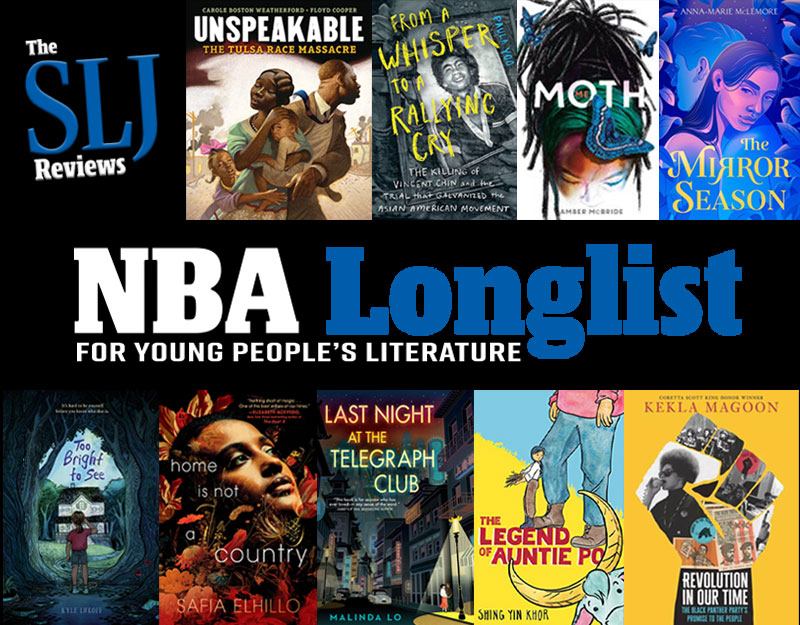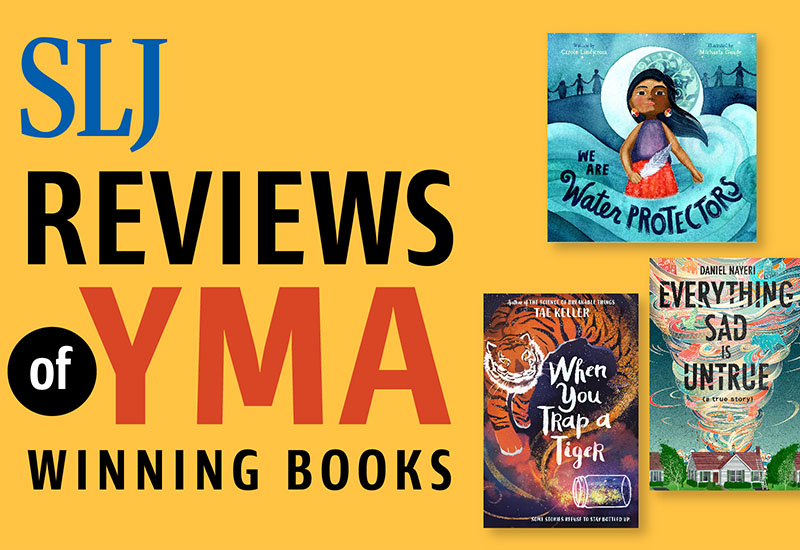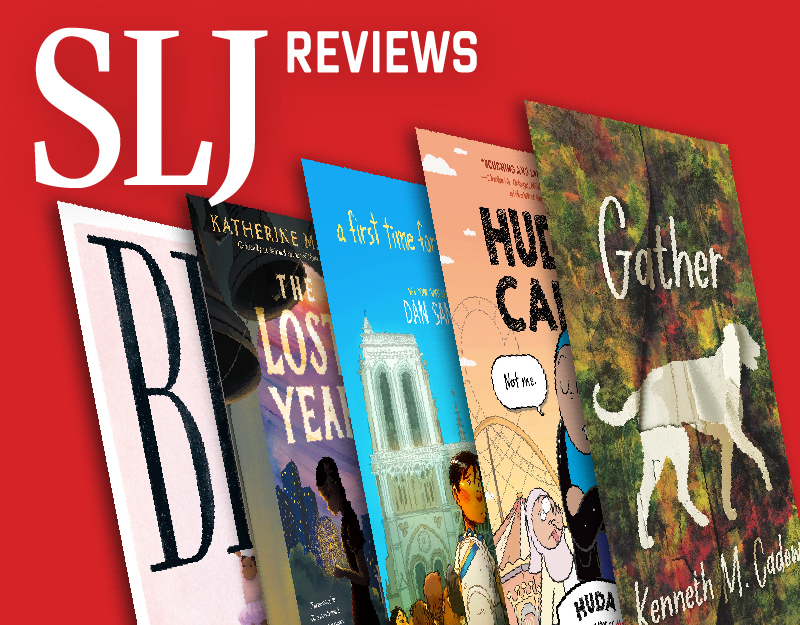Out of my mind
I’ve been holding back on the Mockingbird discussion because I still haven’t finished it. I started it when I first got it…voice drove me nuts…I didn’t finish it. It’s next on my pile, as I just finished…
…Sharon Draper’s Out of Mind, and while I think this is a great book, I’m actually very surprised at the amount of support it seems to be getting  (that is, at least on Goodreads). Melody’s voice is wonderful. And, that’s about all I can say in regards to the Newbery criteria. The other characters seem pat, the story is predictable. I have a number of “really?” passages marked. (The family really never looked into talking technology for Melody before? Mr. Dimming is really that dim?) The book serves its purpose, and well. But its didactic intent is not a consideration for Newbery.
(that is, at least on Goodreads). Melody’s voice is wonderful. And, that’s about all I can say in regards to the Newbery criteria. The other characters seem pat, the story is predictable. I have a number of “really?” passages marked. (The family really never looked into talking technology for Melody before? Mr. Dimming is really that dim?) The book serves its purpose, and well. But its didactic intent is not a consideration for Newbery.
ADVERTISEMENT
ADVERTISEMENT
It does bear a parallel to Mockingbird in this. Anyone read both?
Filed under: Uncategorized
About Nina Lindsay
Nina Lindsay is the Children's Services Coordinator at the Oakland Public Library, CA. She chaired the 2008 Newbery Committee, and served on the 2004 and 1998 committees. You can reach her at ninalindsay@gmail.com
ADVERTISEMENT
ADVERTISEMENT
SLJ Blog Network
2024 Books from Coretta Scott King Winners
The Ultimate Love Letter to the King of Fruits: We’re Talking Mango Memories with Sita Singh
Monkey King and the World of Myths: The Monster and the Maze | Review
Parsing Religion in Public Schools
The Tortured Poets Department Poetry Party Part 2: DIY Frames for Your Instant Photos
ADVERTISEMENT







I have not read both. I have had Mockingbird on my tbr pile ever since its publication, but can’t bring myself to read it, so it keeps getting buried.
I have read Out of My Mind and feel the same way that you do. I didn’t mark passages, but kept wondering how in the world, two highly educated and involved parents would not have discovered this and/ or advocated for more earlier. Then I felt guilty. I did love a lot about it. I think many of the scenes are heartbreakingly realistic. But Newbery? No.
brenda
Yep. And I found similarities between the two books as well. Of the two, I preferred Draper’s book, but there was one problem I had with both titles that perturbed me. In neither book does the author explain how they researched the subject. Of course if you do a little digging you’ll find that both authors have family members with the disabilities covered in their books, but shouldn’t there at least be a brief mention of this somewhere? I would have liked a little Bibliography of sources, but failing that just a mention on the bookflap would have sufficed (as Cynthia Lord did years ago with “Rules”). I wonder why the silence. It would have let me undstand that they knew from whence they spoke, after all.
I did read both novels. I can echo you on the “really” passages from Out of My Mind. In addition to what you’ve already mentioned in regards to “really” passages, it seemed very forced to me to have the whole team leave for Washington DC without her. And, of course, there’s a predictable snow storm that will not allow her to catch another flight or other means of travel to make it there on time. And, of course the team lost without her, but *wow*, she comes away from the experience with all sorts of friends and a teacher who finally appreciates her for who she really is, rather than who she seems on the outside (sense the sarcasm).
Mockingbird I also wasn’t that impressed with. As Johnathan noted in his post, it just tried to do too much – it was a book on disabilities, a book on dealing with deal of a brother, a book on school shootings, etc. all in one. It’s not completely implausible that a girl with disabilities may have a brother who died in a school shooting, but in this story, it doesn’t actually seem plausible either.
Joey Pigza still remains as my favorite character with mental disabilities. As far as this year’s race for the Newbery, I have One Crazy Summer, Scumble, and Keeper towards the top of my list, with Forge, Sugar Changed the World, and The Good, the Bad, and the Barbie still in my pile to read.
I was also incredulous over why the seemingly invested, and intelligent parents didn’t look into communication options for Melody long before 5th grade. Of course that would have ruined a key plot development. Being married to a School Psychologist, I am constantly reminded of Special Education laws. I was baffled that a few of Melody’s early teachers never triggered a law suit.
On the other hand:
I can’t keep OUT OF MY MIND on the shelves. It is a word-of-mouth phenomenon. I have noticed that a certain type of empathy-inducing book is like cat-nip to 6th grade girls, which is why THE DIARY OF ANNE FRANK will never die.
The way I see it: Newbery book? No. Great middle-grade novel? You betcha.
Most of my problems with it fall under those same logistical categories that both of you mentioned. You have to fight really, really hard for many years to get a speech device and a 1:1 aide — school districts, insurance companies, etc. Clearly her parents are invested in her success, informed about her options, confident in her intelligence, and strong, persistent advocates. So there’s some dissonance there — she had daily access to a letter board and (it’s explicitly stated) perfect spelling and grammar… but nobody paid attention? And she was still in a sheltered classroom? That’s the real problem facing real-life kids in Melody’s situation — access to learning and using structured, fluent, verbal language, accomplished through gifted teachers and advocates who can take on school districts and insurers for their children. Verbal fluency alone is an almost insurmountable real-life hurdle — developed only through massive amounts of work and persistence and luck and support — that this book pretty much ignores, as it ignores the fact that few parents have access to the financial and educational resources that it takes to be a full-time fighter for their child’s rights. In doing so, I think it really does a disservice to the many people who fight for access so that they (or their children) can communicate successfully. This would have been a very different book, with different problems, if Melody’s parents hadn’t had the education, resources, and access that they did — and that many people do not have.
I want to hear reviews from assistive device users, and people within that larger community. Is it enough to be represented positively in a book? If a story makes a fifth grader reassess her perspective on a kid with CP, does that make the book a success? Is it only as a politicized adult that I expect more nuance, characters with depth and personhood beyond what they represent? I don’t mean to be pat here, because I think these are genuinely important questions — with so little representation of disability out there, is this a truly noteworthy and commendable example of literature for young people?
I don’t mean to be entirely negative about the book, either, because I think there are some things that it accomplishes with an expertise and sensitivity that few books have achieved. The descriptions of Melody’s physical reactions, for example, have an authenticity that just shines. There are a lot of wonderful things in it. But for me as a reader, they’re not quite enough.
A quick p.s.! I just re-read my comment and I totally didn’t even acknowledge Ms. Draper’s own expertise — a huge omission. Obviously she offers a parent-insider’s perspective on all of the issues she raises in the book, even though she is very clear in the introduction, saying that Melody is her own character and not based on her daughter or any other individual. So her knowledge as an author is extremely powerful and commands a lot of respect from me as a reader.
I wish that resolved the dissonances that I see in the text — are some just that it’s not reflective of 2010 and should have been historical fiction? I don’t doubt the author’s understanding or knowledge of her subject, even if I’ve voiced concerns about some logical problems I perceive. Just thought that was important to clarify!
I brought up the “her parents have really *never* heard of this technology??” question to a friend of my who works with severely handicapped children, and she said I would be shocked and appalled at the lack of self-education about their child’s disorder among many parents. Yet at the same time Melody’s parents seemed very involved, the type that would be researching these sorts of things on their own. And even if many of Melody’s early teachers were criminally incompetent, children, especially children with severe physical handicaps, are not isolated to school and home. Where were the doctors, physical therapists, occupational therapists, and myriad other specialists and why weren’t they recommending this technology?
I didn’t like the “plane left early” plot twist either. Any airline that made a habit of leaving early without its passengers is not going to get a lot of repeat customers. There could have been other ways that the quiz kids could have been heinous to Melody without such an unlikely scenario. I also think the teacher would have called to let her parents know that the plane had left, rather than letting them show up at the airport. By not calling the parents, he opens himself up to even more discrimination charges. I felt the author was manipulating this scene simply to make the final realization more dramatic, since finding out in the airport as they’re about to leave is more devastating than a simple phone call.
I agree with DaNae: I liked this book, I can’t keep it on my shelves, and middle grade girls are both fascinated and will learn something of empathy, but I don’t think it’s Newbery quality.
I agree with both of you completely. Do have to say this went down a lot easier for me than MOCKINGBIRD.
While I found the voice in Out of My Mind much less grating than the voice in Mockingbird, I still don’t think it’s Newbery quality. I can definitely see how it’s the kind of book that’s a word of mouth phenomenon, like DaNae said, and an interesting, compelling read, but I didn’t see much to distinguish it in terms of plot or characters (the side characters). It takes a long time for anything to happen, and when things do happen, it doesn’t feel organic but more like a plot imposed by the author to pick up the pace and introduce some drama. And yeah, they really didn’t look into new technology before this?
I don’t want to detract from the Newberiness of this discussion. But since these two peer reviews from my students came in today on OUT OF MY MIND, and you happen to be discussing the book, I thought I’d share.
From a boy who admitted the book made him cry:
“This book definitely changes your view of the world and the people inside of it. It makes you feel sorry, sad, and angry. It changed my life.”
From the world’s sweetest 6th grader:
“This book makes you think about people in your school. Do you say hello. No, you smile and show that you feel sorry. People like Melody don’t want that. They want a friend. Try it; it will change your life.”
I’m with you, DaNae, OUT OF MY MIND booktalks itself. It’s been a runaway hit with both boys and girls in my library. I loved Melody’s voice as well.
I found the insider-perspective-of-an-outsider in both works compelling. But I agree with Monica- there was definitely something easier about getting into Melody’s mindset. Perhaps it’s because the very nature of autism can be alienating for ‘typical’ readers. I’m not sure.
Both books presented some glaring plot issues, though. In OUT OF MY MIND, besides the failure of her parents to look into communication devices earlier, I was not convinced by the episode with the near-death of her little sister. That, to me, felt manipulative. In MOCKINGBIRD, I thought the resolution was too schmaltzy and convenient. There were a few lines of dialogue between Caitlin and her father that felt forced and overly sentimental. I think that’s what I appreciated more about OUT OF MY MIND- it was tougher. And while the conclusion wasn’t as organic as I’d hoped, Melody’s development unfolded more authentically than Caitlin’s.
I read MOCKINGBIRD and OUT OF MY MIND too close together — they detracted from the memory of each other. By the time I read the second one, I felt like I’d already heard this story. In fact, now I’m trying to remember which I read first! I think the one I read first was the one I liked best, but now I’m not sure which one that was. I think it was probably OUT OF MY MIND, which hit a little nearer home because some good friends have a son with cerebral palsy. But I’m not even sure. My feeling with both books was that they were very good — but not Great.
I found Melody’s voice more consistent and convincing than Caitlin’s. I think OUT OF MY MIND maintains a tighter focus on a theme kids can connect with – living in a shell that doesn’t seem appealing, fear of and the experience of rejection and being left out. Most kids can relate even though they don’t have cerebral palsy. MOCKINGBIRD tried to bring together disparate themes which had difficulty in my mind reaching resolution in simplistic ending.
I’ve now MOCKINGBIRD as well…and don’t quite understand the NBA nomination for this one. It’s a good book, solid, but there isn’t a whole lot there…characters, setting, theme are not developed much through the story. It seems like a surface level treatment to deliver a message…which is clearly the author’s intention, from her note. She does an excellent job of what she intended. Sharon Draper does a better job, I think. Neither seem to me to be Newbery level writing.
(I finsihed MOCKINGBIRD on the plan to Chicago, where I’m now at the downtown Main Library for the Internet connection. Holiday Inn: bad points on the wireless! Harold Washington Library: 10 points for customer service! This may be it for me though for the next few days,)
Not sure if you all are aware, but OUT OF MY MIND is the selection for the Global Read Aloud project. This might explain why there are so many reviews and it cannot be kept on the shelf. Many of the reviews are coming from upper elementary and middle school students. From a teacher’s standpoint, the book is excellent for teaching literary devices to adolescents. The plot keeps their attention, and the examples of foreshadowing, figurative language, etc. are easy to find. We (my students and I) have had the same questions that you all have. We were wondering why the parents didn’t look into technology earlier. There are other parts of the plot that don’t make ‘common sense’, so we discuss these as they arise and move on to the next chapter. It’s not a perfect novel, but it is serving its purpose for the Global Read Aloud quite well. It has also opened up a lot of great extension activities, like researching cerebral palsy and other disabilities. The story is rich with opportunity for self reflection, as well.